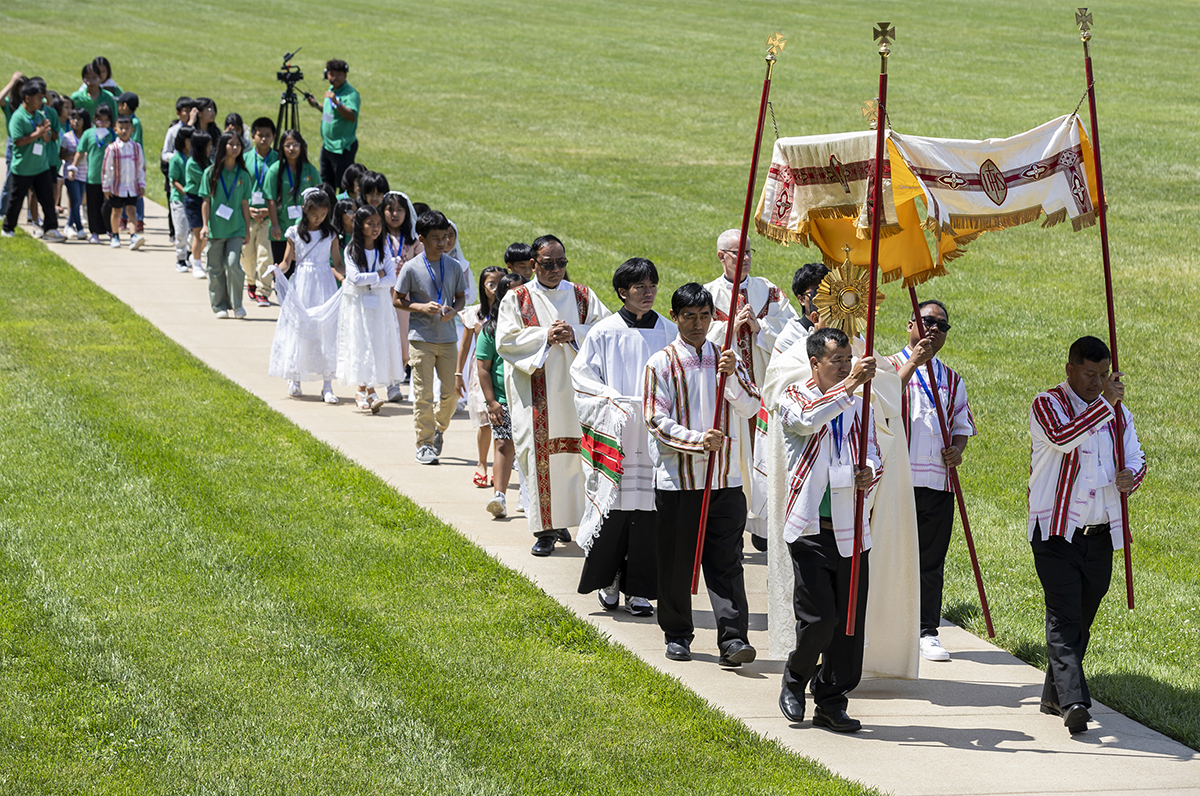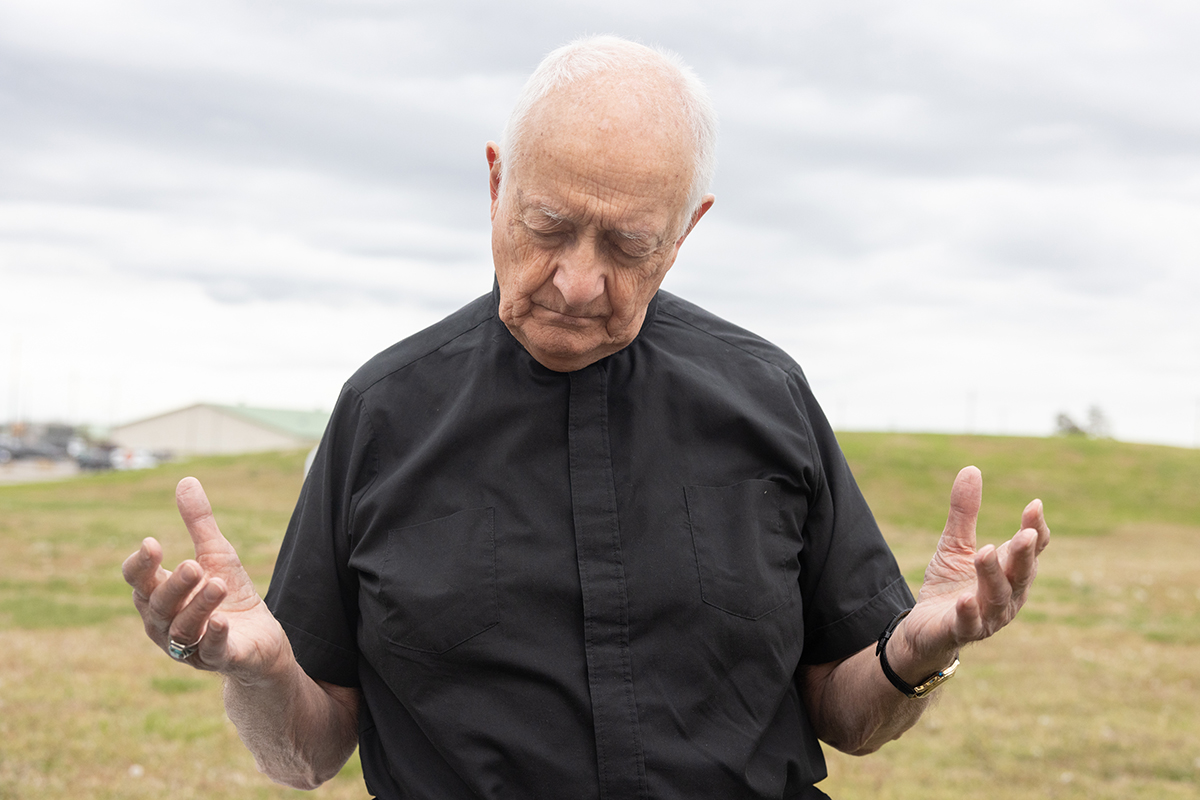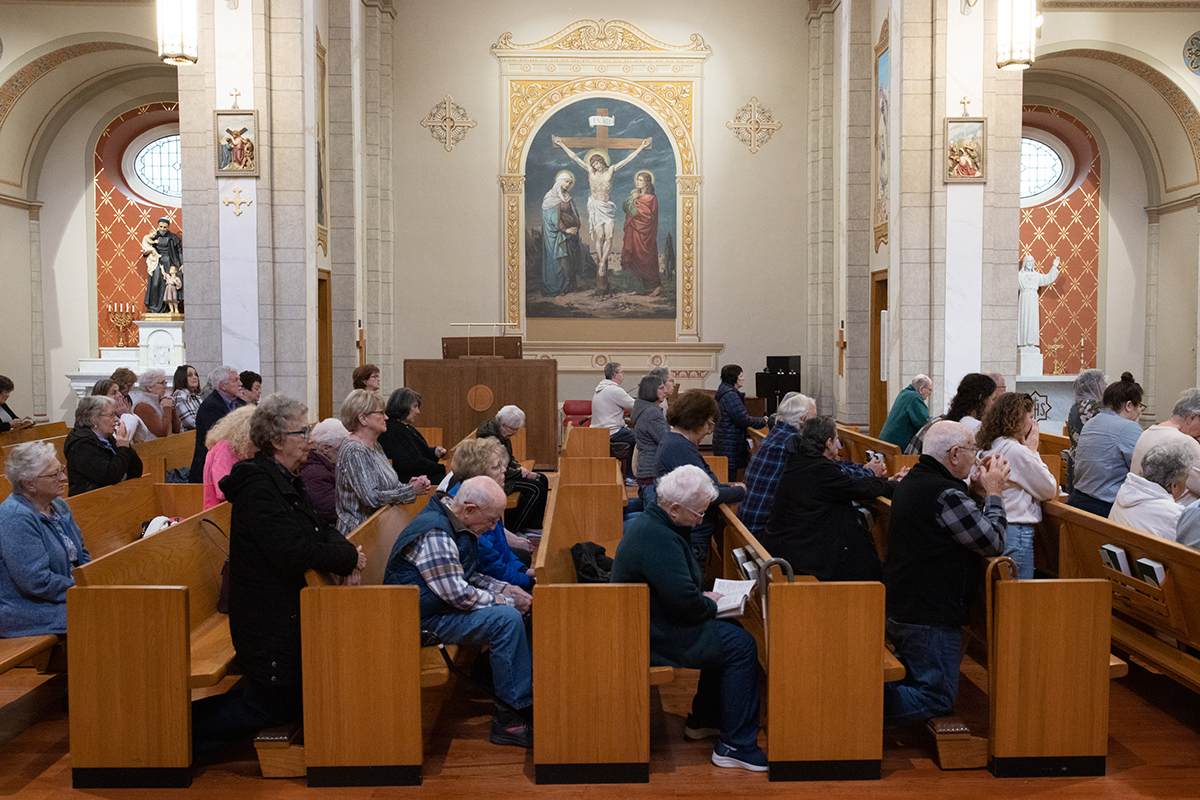“Not to be served but to serve”
On the heels of Auxiliary Bishop Mark S. Rivituso’s episcopal ordination four days prior, four men were ordained as transitional deacons May 6 at the Cathedral Basilica of St. Louis.
Archbishop Robert J. Carlson ordained Gerson Parra, Philiphraj Rathinam and Christopher Rubie for the Archdiocese of St. Louis and Daniel Koko-Oleko for the Diocese of Tshumbe (Democratic Republic of Congo). Bishop Rivituso, Bishop-emeritus Robert J. Hermann and Bishop Felipe Sãnchez from the Diocese of Chiquinquira, Colombia concelebrated, along with archdiocesan priests.
In addition to family and friends, Kenrick-Glennon Seminary classmates and colleagues were in the congregation, celebrating the men’s diaconate ordination en route — “God-willing,” as men in formation say — to priestly ordination next spring.
“May you always be like Jesus, who came not to be served but to serve,” Archbishop Carlson said in the homily.
Each took a long and winding road in answering God’s call, each with a unique path toward Holy Orders. Here are their calls to service.
‘God … invited me into this journey’
Among Deacon Rubie’s earliest memories, Sunday Masses with his grandparents stand out. He often spent weekends with them, and they attended Queen of All Saints Church in south St. Louis County.
“I remember just being intrigued by the Mass, just fascinated with the smells and everything,” he said. “I have very special memories going to Mass with them.”
The second of four brothers, with two step-brothers and a step-sister, he was baptized Catholic, and thoughts of becoming a priest crossed his mind while in high school at Lutheran South. But those were just passing thoughts for a teenager who focused his energy on playing hockey for the high school team.
After high school, he didn’t give the priestly vocation much thought until a serious car accident in 2001, when he was 20. He suffered a broken pelvis, two broken ribs and a serious concussion, prompting significant soul-searching. “That was really the starting point of me getting more involved with the faith,” he said.
Recuperating at home, he would surf the channels and stop at EWTN’s broadcast of the Mass. Like the child with his grandparents at Queen of All Saints, he was enthralled, “really drawn to the priest celebrating the Mass, the person representing Jesus,” he said.
Seminary became an option, but he needed to get his grades up first, which he accomplished in a junior college. He also discovered an interest in philosophy, which led to a bachelor degree in philosophy at Webster University and led him to pursue a career teaching philosophy. When that didn’t pan out, he opted for a law career. Despite earning a master’s degree in legal studies from Webster University, that avenue proved fruitless as well, prompting a renewed focus on the seminary, which accepted him.
Deacon Rubie came to realize that his professional disappointments actually were God’s providence.
“I was basing my happiness and self-worth with having professional success,” he said. “When that was not happening, I just listened to what God wanted. … It’s amazing because He invited me into this journey. He’s opened doors beyond anything I could do. That’s a great testament to God’s providence. He’s guided me in ways I never expected or never would have tried to do on my own.”
‘God, What do you want me to do?’
A chance meeting with Archbishop Robert J. Carlson brought Deacon Parra to Kenrick-Glennon.
Archbishop Carlson visits Colombia regularly through his support of the Messengers of Peace. Founded in 2005, the religious community is dedicated to praying for peace in Colombia and around the world. Members also minister to the young, elderly and poor.
Deacon Parra met Archbishop Carlson when a friend was ordained to the priesthood in Colombia. Neither spoke the other’s language, but Archbishop Carlson invited him to the Archdiocese of St. Louis.
Priests among friends and family have been a staple in Deacon Parra’s life, including Alexis Arias, his “amazing nephew,” as he calls him.
Born and raised Catholic, Deacon Parra was active in his home parish, Parroquia San Martin De Porres in Sardinata, Colombia, in the diocese of Cucuta as a youngster and teenager. He received the sacraments there – baptism, first Communion, first reconciliation and confirmation. He also graduated from the parish’s elementary and high schools.
“I grew up a very Catholic person,” said Deacon Parra, who first felt called to the priesthood at age 9.
He spent about 10 years after high school discerning the call. From the university in Cúcuta, he went into the seminary, then served for a time as missionary in Colombia. In 2011, he returned to St. Thomas Aquinas University for philosophy and religious education.
Meanwhile, priest friends often asked whether he was interested in becoming a priest.
“I said, ‘I don’t know; I need to pray about it,'” he said, adding that in prayer, “I asked God, ‘What do you want me to do?'”
Ultimately, he discerned the call to the priesthood and devoted his life to God.
After meeting Archbishop Carlson, Deacon Parra came to Kenrick-Glennon, spending a year studying English before entering theology studies.
“I am very happy,” said Deacon Parra, who works with the archdiocesan Office of Hispanic Ministry and demonstrates the “love for God. It’s so exciting.”
‘I felt it was in response to my prayers’
Deacon Rathinam began his vocation story about a quarter century ago in his native Tamil Nadu, India, where he grew up in what he describes as a “very Catholic atmosphere” in his immediate and extended family. He drew inspiration from a pastor, who asked the magic question: What do you want to be when you grow up?
“I said, ‘I want to be a priest like you,’ but I was only 10 years old; it did not make a lot of sense because I was just a little child,” said Deacon Rathinam, with a laugh. “But as I grew up, it became my vocation.”
Deacon Rathinam entered a religious community after high school in 1999 to officially start his journey of many “ups and downs, and ins and outs,” he said. “I terminated my formation four times.”
In exiting the four communities, he still felt called to the priesthood just not to that particular community, with “a profound God experience” in 2004 driving that point home. At a retreat, attended by thousands, he heard a voice from the stage say, “Philip, don’t be afraid” and “I will not abandon you.”
“I felt it was in response to my prayers,” he said.
Throughout his stints in religious communities, he earned bachelor’s degrees in history and education (with specialization in teaching social studies and English) and a master’s degree in English on the secular side, with a bachelor’s degree in philosophy and a master’s degee in theology on the sacred side. However, in gaining vast experience in community’s charisms, “I never felt the joy of the priesthood,” he said.
This led to the last shift in his vocation, to Kenrick-Glennon from the Society of Our Mother of Peace in High Ridge. He enjoyed the religious community’s house-to-house evangelization — “sowing seeds'” he said — but “I did not feel called to that way life. … I felt called to diocesan life.” Hence, his entrance into Kenrick-Glennon two years ago.
With his theological studies completed in India, he was able to live full-time in a parish and throw himself into pastoral ministry, first at Epiphany Parish in St. Louis and for the past year at Mary Queen of Peace Parish in Webster Groves, where he teaches religion at the parish school.
“I love parish ministry, I love teaching the faith,” Deacon Rathinam said, noting the archdiocese provides ample opportunity to do both. “I finally feel that joy. This is it. I’m so excited I found the joy of priesthood.”
‘I love my country’
Born in the jungle village of Mbaka in the Democratic Republic of the Congo, Deacon Daniel Koko-Oleko was raised in a Christian family, but their brand of Christianity anticipated the year 2000 being the end of the world.
Of course, “nothing happened,” said Deacon Koko-Oleko, who grew up without basic necessities of life that Americans take for granted. “No electricity, no plumbing, no running water, no fridge.”
In fact, water was carried from a nearby stream.
By 2003, Deacon Koko-Oleko had decided to be baptized and convert to Catholicism, but there was a problem with that. In his culture, even at 15 years old, a child needed his parents’ permission to make such a step.
Ultimately, they agreed and gave him permission to convert, starting him on the road to the priesthood. “God-willing,” he said, he’ll be ordained to the priesthood for the Diocese of Tshumbe – his home diocese in Democratic Republic of the Congo — next year.
Starting in 2003, he attended St. Gabriel minor seminary, a high-school equivalent. After graduation in 2009, he entered Paul IV College Seminary and graduated with a degree in philosophy in 2012. Through high school seminary, he said, priests became his role models and “I felt God was calling me to follow Jesus Christ.”
Despite receiving education in cities such as Lodja (70,000) and Kabinda (200,000), plumbing and electricity remained luxuries, with no running water and intermittent electricity in each city. In preparation to travel to the U.S., Deacon Koko-Oleko studied English in Kinshasa, the capital of the D.R. Congo, and finally enjoyed these luxuries for the first time.
He arrived in St. Louis in January 2014, perfect timing to experience true cold and see snow for the first time. “It was freezing,” said Deacon Koko-Oleko, who nevertheless tried skiing and became an avid fan of St. Louis Blues hockey, even though soccer is his sport.
The cold weather and perks of running water and electricity soon will be in his rear view. Although he’s enjoyed his time studying theology at Kenrick-Glennon, there’s no place like home.
“I’m really looking forward to going back,” he said. “I do like America, but I love my country. Love for my country hasn’t changed.”
On the heels of Auxiliary Bishop Mark S. Rivituso’s episcopal ordination four days prior, four men were ordained as transitional deacons May 6 at the Cathedral Basilica of St. Louis. … “Not to be served but to serve”
Subscribe to Read All St. Louis Review Stories
All readers receive 5 stories to read free per month. After that, readers will need to be logged in.
If you are currently receive the St. Louis Review at your home or office, please send your name and address (and subscriber id if you know it) to subscriptions@stlouisreview.com to get your login information.
If you are not currently a subscriber to the St. Louis Review, please contact subscriptions@stlouisreview.com for information on how to subscribe.






